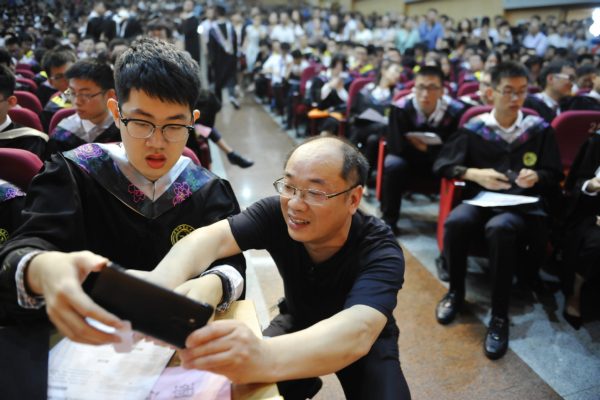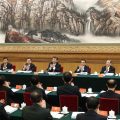
Early access to undergraduate studies helps academically talented young people exploit their potential to the fullest. Zhu Lixin reports from Hefei.
Early this month, Zhu Yuanhao and six other students sat in the conference room of the School of the Gifted Young at the University of Science and Technology of China in Hefei, capital of Anhui province, and answered questions posed by a group of reporters.
The school’s students rarely give interviews, partly to avoid overexposure and partly because most of them are younger than 18, and therefore juveniles.
“Too much exposure to media reports may place unexpected pressures on young students and can sometimes make them a little arrogant, so we seldom permit reporters to interview them,” said Chen Yang, dean of the school.
Zhu was the first to answer a question. As the only student in the group from the school’s senior class, he decided that it was his responsibility to soak up the pressure on behalf of his peers, even though the 19-year-old was not the oldest scholar in the room.
In most cases, students who show exceptional academic aptitude at an early age can be recommended to the school by their teachers. To gain entry, they have to take the gaokao, the national university entrance exam, years ahead of schedule. If they pass the exam and an interview, they will be accepted by the school for undergraduate studies.
To help celebrate the 60th anniversary of USTC, a large number of alumni will gather at a celebratory event on Thursday.
This year is also the 40th anniversary of the founding of the Class of the Gifted Young, which opened in 1978 and became the School of the Gifted Young in 2008.
To illustrate the development of the school, the college has organized an exhibition that contains photos of many renowned alumni, mostly scientists.
Most share the same distinction-they became prominent in their fields at very young ages, with several becoming professors at leading universities across the world while only in their 20s.
One of the names on the long list was Cao Yuan, who graduated from the School of the Gifted Young in 2014 and is now a 21-year-old PhD candidate at the Massachusetts Institute of Technology.
On March 5, the journal Nature published two articles on major breakthroughs in graphene research in which Cao was lead author.
Though he appreciates Cao’s success, Zhu has no plans to follow in his footsteps.
“I won’t study overseas because I have a research place in Professor Du Jiangfeng’s laboratory, which is the best in the world for research on quantum information,” he said. Half of the researchers in Du’s laboratory are graduates of the School of the Gifted Young.
Du, who was born in 1969 and graduated from the class in 1990 after five years of study, is not only vice-president of USTC, but also director of its Key Laboratory of Microscale Magnetic Resonance.
When he was elected to the Chinese Academy of Sciences in 2015, Du became the first graduate of the class to be accorded the honor.
Early start
Zhou Jianuo, 14, spent his primary and middle school years in Russia because his father is a diplomat in the country. However, he wanted to attend university in China, and USTC was his first choice.
Though he performed well at school in Russia, his family was concerned that he would not be able to adapt to the Chinese education system and would fail the gaokao.
Competition in the gaokao is always fierce. For example, 419,000 students took the exam in Anhui this year, but only 43.9 percent were accepted for undergraduate studies, according to the provincial education department.
Gaining entry to a top university is an even tougher task. USTC, Anhui’s best university, recruited just 186 students from the province this year, while the number of successful candidates from other parts of the country was even lower.
To beat the competition, students at senior high schools study the same topics repeatedly and take a large number of mock exams. That regimen can stifle creative minds, according to experts.
“They scarcely learn any new knowledge in the third year of high school, and the intensive training for exams is harmful to really talented, creative kids,” said Yin Min, Party chief at the School of the Gifted Young.
Chen, the dean, who attended a regular school, said, “We are not criticizing the regular education system, as most of the great people we know were educated in it.”
While in Russia, Zhou studied textbooks used in middle and high schools in China, mostly on his own. It was a risky strategy.
“I could have failed to gain admission to a good high school, not to mention a key university, as my parents and I feared,” he said.
He returned to Beijing at the end of last year, when he was in the second year of middle school, and attended a high school for six months before taking, and passing, the gaokao.
Zhou joined the School of the Gifted Young last month, thus beginning his university career about four years earlier than most USTC freshmen.
Chen said, “Fair education is not just about giving students in different areas equal access to good resources, but also about providing highly gifted kids with a wider range of possibilities, instead of forcing them to follow the regular routine.”
Making an early start at college allows talented individuals to have longer careers because they leave earlier than regular students, he added.
In a lecture he delivered in Beijing in 2001, Tsung-dao Lee, who was awarded the 1957 Nobel Prize in physics at age 30, listed dozens of the world’s greatest scientists, most of whom made their scientific breakthroughs in their 20s and 30s.
In the 1970s, Lee, a Chinese-American physicist, suggested that China should establish the Class of the Gifted Young.
Zhang Yaqin was one of first students to be recruited, at age 12. Later, Zhang became global vice-president of Microsoft Corp and president of the Microsoft China R&D Group. He is currently president of the internet giant Baidu.
Great expectations
Recalling his own gaokao experience, Zhang said even the people who sold bus tickets in Hefei refused to take his money when they learned he would be joining the Class of the Gifted Young.
Despite their academic success, high expectations can sometimes exert excessive pressure on the students.
“Before we enroll at the university, we are often the best, to be honest, in our schools in terms of academic performance. But in this class, we discover that we are not so special,” said Zhang Yi, one of just eight female students recruited in 2016.
Students who fail to make the grade are released by every department in every university, and the Class of the Gifted Young is no exception.
Students in the class only attend a limited number of courses together, and in most courses they study alongside regular students because the lectures are designed for all scholars.
All students in the School of the Gifted Young are allowed to set their own timetable, even for some compulsory courses.
They have to finish the courses and pass the exams, of course, but they are allowed to decide the year and semester in which they will attend. While that flexibility is welcomed, it can result in problems.
“In the hope of finishing their courses earlier, some students overstretch themselves and choose too many courses in the first two years,” said Lan Rong, one of 15 “proxy parents” employed by the school to oversee the young students’ welfare.
If a student fails several compulsory courses, he or she can be expelled from the university, so the parental substitutes advise their young charges against taking on an excessive workload.
“I know a student who chose more courses than he could handle in the first year. As a result, he is regretful because he has to study extremely hard and is more or less exhausted every day,” Lan said.
Instead of questioning students, the proxy parents should observe their behavior to check for possible anxiety or depression, and then find opportunities to chat with them to discover if they have any problems in their lives or studies, she added.
In this way, the school is able to maintain a high standard of intellectual stimulation, while ensuring that the students are not troubled by the burdens that can sometimes accompany exceptional talent.
Looking back over 40 years, Chen believes the special provisions made for academically gifted young people have not only helped them fulfill their own potential, but also proved beneficial to their teachers and the other students.
“The class has proved successful in the past 40 years and has provided a great deal of practical experience, which has had a very positive influence on the whole university,” he said.


